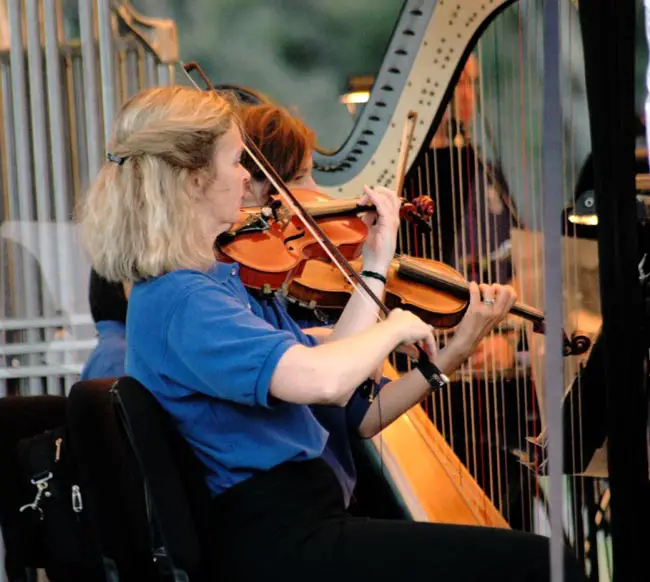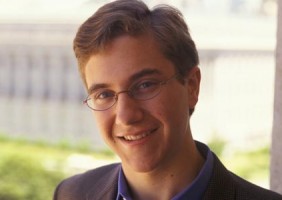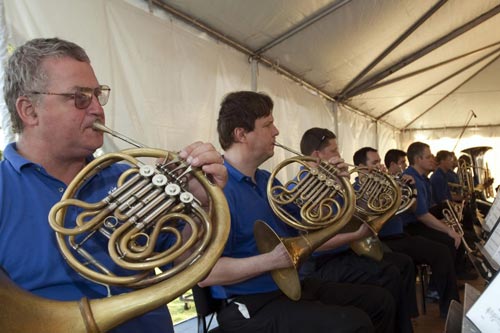
Buckle up buckaroos, and forgive the awful cliché, but it’s for real this time: “Buckaroo Holiday,” from Aaron Copland’s Rodeo Suite, is the opening number, in a lasso of cymbals, drums and ballsy brass, in the Jacksonville Symphony Orchestra’s Picnic and Pops concert at Town Center Sunday evening, the kind of concert early summer evenings and knock-on-wood romances are made for. (A few tickets are still available.)
The annual concert is becoming a local tradition, compliments of the Palm Coast Arts Foundation, which uses the occasion as the principal fund-raiser for its signature hope for a concert hall and arts center in town. Some 600 people are expected to stack up around 60 tables (at $30 a person, food, candles and booze not included) in a giant potluck: you bring all you can consume while the 52 musicians of the Jacksonville Symphony provide the evening’s soundtrack. And what a soundtrack.
Click On:
- Arts Foundation’s Music in the Air All Weekend
- Jacksonville Symphony Orchestra
- Palm Coast Arts Foundation
- The Culture Archives
Rodeo is actually a ballet suite, the story of a wedding on a ranch that Copland wrote as a rousing homage to folklore and the old West. Copland somehow managed to write the whole thing in his Upper West Side flat in Manhattan, a contrast with Rodeo’s setting almost as radical as the centerless flatness of Town Center. The opening measures seize and sling you from the waist up, as if to defy you to stay in your seat–which the sold out audience at Rodeo’s premier at New York’s Metropolitan Opera in 1942 could not do. The performance, with Agnes de Mille on stage (she played the cowgirl) and Copland, Richard Rogers, Oscar Hammerstein and Martha Graham in the audience, drew a standing ovation and 20 curtain calls. Buckaroo Holiday and the Hoedown movement that closes the ballet have become standard operating openings and closings at pops concerts, minus the dancers. (You can hear Christopher Franklin’s version of Buckaroo Holiday here.)
The concert, dubbed “Americana Under the Stars,” doesn’t let up with the old favorites. To dust off the hay, a symphonic version of Joplin’s syncopated melancholy follows with “The Entertainer,” then Debussy’s arrangement of one of Satie’s Gymnopedie (thankfully not the overly played first, but the moving, haunting third) before returning to fourth gear with a Strauss polka (the one where he seems to be making fun the French, as Germans are wont to do) and Gershwin’s Overture from “Girl Crazy.” (Enter your favorite “who could ask for anything more” pun here.) There’s two more rhapsodic pieces before intermission, the kind that make your glands giddy, so you get the idea: bring wine. Lots of wine.
“It’s truly something for everybody,” says Sam Perkovich, president of the Palm Coast Arts Foundation. “You don’t have to be a long-haired classical fan to love the program.”

The orchestra will be under the direction of Teddy Abrams, who at 21 is closer in age to the many students of the Flagler Youth Orchestra who’ll be in attendance than to the rest of the more wrinkly audience. Fabio Mechetti is the music director and principal conductor of the Jacksonville Symphony, though he generally doesn’t deign descend to pops gigs in the provinces. But Abrams is no sub. He’s an assistant conductor at the New World Symphony Orchestra, the Michael Tilson Thomas academy whose alumni become leading performers the world over.
For the Jacksonville Symphony, the performance is one of about a dozen pops concerts a year—eight at its home at Jacoby Symphony Hall in Jacksonville, the rest around the state or across the border in Amelia Island.
“The outlying communities are very integral to the support of a professional orchestra,” says Paul Witkowski, the orchestra’s public relations director. “It’s all about building those relationships.”
It’s about sharing the music, naturally. It’s also about survival, and reminding communities beyond the immediate periphery of an orchestra’s identity, that it exists. Symphony orchestras are in trouble all over the place, cancelling productions and tours, reducing their ranks, and even, in the case of the Philadelphia Orchestra just two weeks ago, filing for bankruptcy. That orchestra faces a $13 million deficit. The Jacksonville Symphony, now in its 62nd season, has seesawed between deficits and modest profits for the past dozen years while maintaining an ambitious schedule of lighter and serious concerts—this year’s included Brahms’ Fourth Symphony, Beethoven’s Ninth and Rachmaninoff’s Second Piano Concerto—and Mechetti’s specialty: an annual opera (Donizetti’s “Elixir of Love” was this year’s, Puccini’s “La Bohème” is scheduled for next year).
Bringing it down to Palm Coast isn’t cheap: it cost $25,000 a concert in past years, making it very difficult for the foundation to break even, let alone raise money toward its future plans. But the Jacksonville Symphony has grown to love its Palm Coast connection enough to discount its performance this time, and making it easier to keep the tradition going—and to give the foundation a boost.
“It’s our most important event,” Perkovich said, “and it clearly signifies the continuing partnership between the Jacksonville Symphony and the Palm Coast Arts Foundation. They’re very supporting of our venture to build our building, and they hope to make Flagler County their second home in the future.”
But Sunday isn’t about dollars and deficits. At least not for those couple of hours the Jacksonville Symphony will be on the brick stage of Town Center’s lake rim. It’s about John Williams’s Cowboy Overture—which owes its cadences and contrasts to Copeland and will open the second half of the concert in an echo of the Rodeo opener—and Marvin Hamlisch’s “Chorus Line,” it’s about Irving Berlin, Tchaikovsky, “Pirates of the Caribbean” and a surprise or two to close out the evening. It would be nice if Palm Coast could muster 20 curtain calls for this one.






























Leave a Reply